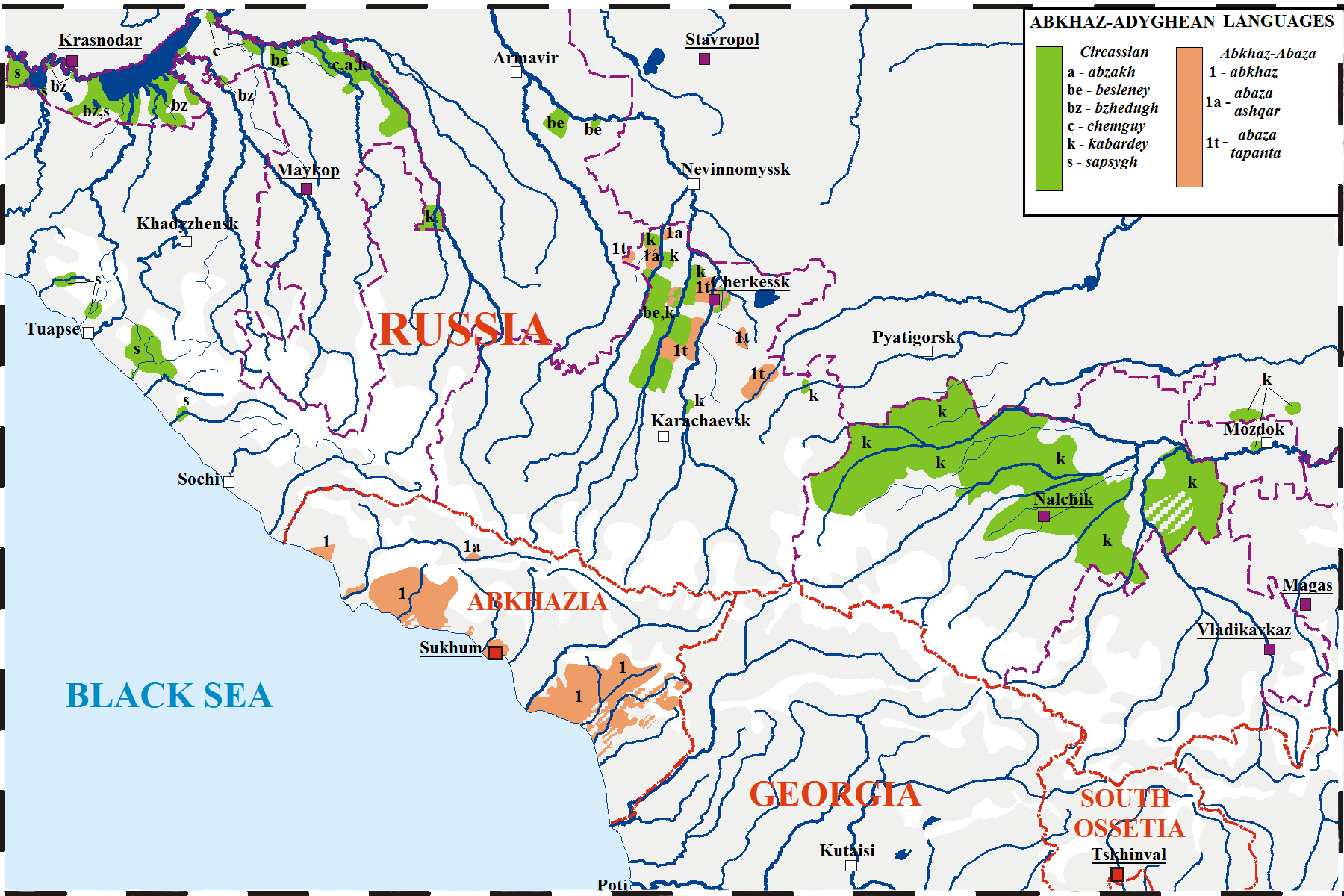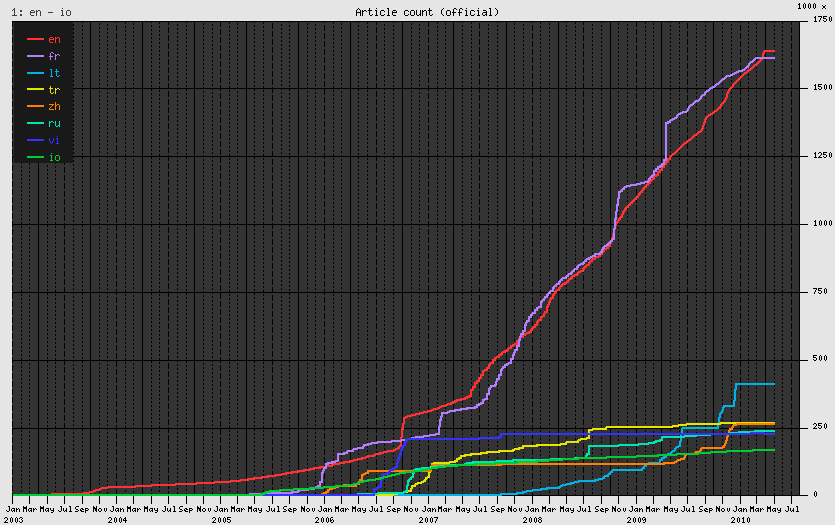|
Proto-Northwest Caucasian Language
Proto-Northwest Caucasian (sometimes abbreviated PNWC), also ''Proto-Adyghe-Abazgi'' or Proto-Adyghe-Abkhaz, is the reconstructed common ancestor of the Northwest Caucasian languages. Phonology Consonants # In Circassian and Abkhaz, gʷǝ is heart and in Ubykh it's gʲǝ. The most noticeable changes are: *The uvular consonants (/χ/ /ʁ/ /χʷ/ /ʁʷ/) become pharyngeal consonants (/ħ/ /ʕ/ /ħʷ/ /ʕʷ/) in the Proto-Abazgi language. Grammar Numbers Words See also * Proto-Circassian language * Proto-Abazgi language References {{Reflist *STAROSTIN, Sergei A.; NIKOLAYEV, Sergei L. (1994). A North Caucasian Etymological DictionaryPreface External links Abkhaz-Adyghe etymology Northwest Caucasian The Northwest Caucasian languages, also called West Caucasian, Abkhazo-Adyghean, Abkhazo-Circassian, Circassic, or sometimes ''Pontic languages'' (from the historical region of Pontus, in contrast to ''Caspian languages'' for the Northeast Cauc ... Northwest Caucasian l ... [...More Info...] [...Related Items...] OR: [Wikipedia] [Google] [Baidu] |
Northwest Caucasian Languages
The Northwest Caucasian languages, also called West Caucasian, Abkhazo-Adyghean, Abkhazo-Circassian, Circassic, or sometimes ''Pontic languages'' (from the historical region of Pontus, in contrast to ''Caspian languages'' for the Northeast Caucasian languages), are a family of languages spoken in the northwestern Caucasus region,Hoiberg, Dale H. (2010) chiefly in three Russian republics (Adygea, Kabardino-Balkaria, Karachay–Cherkessia), the disputed territory of Abkhazia, Georgia, and Turkey, with smaller communities scattered throughout the Middle East. The group's relationship to any other language family is uncertain and unproven. One language, Ubykh, became extinct in 1992, while all of the other languages are in some form of endangerment, with UNESCO classifying all as either "vulnerable," "endangered," or "severely endangered." The Northwest Caucasian languages possess highly complex sets of consonant distinctions paired with a lack of vowel distinctions, often provid ... [...More Info...] [...Related Items...] OR: [Wikipedia] [Google] [Baidu] |
Proto-Abazgi
Proto-Abkhaz-Abaza (or Proto-Abazgi) is the reconstructed common ancestor of the Abkhaz and Abaza languages. Phonology Consonants The consonant system is reconstructed with a four-way phonation contrast in stops and affricates, and a two-way contrast in fricatives. Below is the table of Proto-Abazgi Alphabet : # In some Abaza dialects the velar consonants turned to uvular consonants. The most noticeable changes are: * The velar consonants become uvular consonants in Abkhaz languages. Grammar See also * Proto-Circassian language * Proto-Northwest Caucasian language References *STAROSTIN, Sergei A.; NIKOLAYEV, Sergei L. (1994). A North Caucasian Etymological DictionaryPreface External links [...More Info...] [...Related Items...] OR: [Wikipedia] [Google] [Baidu] |
Proto-Circassian
Proto-Circassian (or Proto-Adyghe–Kabardian) is the reconstructed common ancestor of the Adyghean and Kabardian languages. Phonology Consonants The consonant system is reconstructed with a four-way phonation contrast in stops and affricates, and a two-way contrast in fricatives. Aspirated consonants to plain In the Proto-Circassian there was a series of aspirated consonants that survived in the Shapsug and Bzhedugh dialect while they became plain consonants in the other dialects. * → * → * → * → * → * → * → * → * → * → Plain voiceless consonants to voiced In the Proto-Circassian there was a series of tense consonants that became voiced in the eastern dialects. * → * → * → * → * → / * → * → / * → / Velar consonants to palato-alveolar In the Proto-Circassian language there exist a palatalized voiced velar stop , a palatalized aspirated voiceless velar stop , a pala ... [...More Info...] [...Related Items...] OR: [Wikipedia] [Google] [Baidu] |
Proto-Abazgi Language
Proto-Abkhaz-Abaza (or Proto-Abazgi) is the reconstructed common ancestor of the Abkhaz and Abaza languages. Phonology Consonants The consonant system is reconstructed with a four-way phonation contrast in stops and affricates, and a two-way contrast in fricatives. Below is the table of Proto-Abazgi Alphabet : # In some Abaza dialects the velar consonants turned to uvular consonants. The most noticeable changes are: * The velar consonants become uvular consonants in Abkhaz languages. Grammar See also * Proto-Circassian language * Proto-Northwest Caucasian language References *STAROSTIN, Sergei A.; NIKOLAYEV, Sergei L. (1994). A North Caucasian Etymological DictionaryPreface External links [...More Info...] [...Related Items...] OR: [Wikipedia] [Google] [Baidu] |
Ubykh Language
Ubykh or Päkhy was a Northwest Caucasian language once spoken by the Ubykh tribe of Circassians who originally lived along the eastern coast of the Black Sea before being deported ''en masse'' to Turkey in the Circassian genocide. The Ubykh language was ergative and polysynthetic, with a high degree of agglutination, with polypersonal verbal agreement and a very large number of distinct consonants but only two phonemically distinct vowels. With around eighty consonants, it had one of the largest inventories of consonants in the world, and the largest number for any language without clicks. The name Ubykh is derived from (), its name in the Adyghe language. It is known in linguistic literature by many names: variants of Ubykh, such as ''Ubikh'', ( French); and its Germanised variant (from Ubykh ). Major features Ubykh is distinguished by the following features, some of which are shared with other Northwest Caucasian languages: * It is ergative, making no syntactic d ... [...More Info...] [...Related Items...] OR: [Wikipedia] [Google] [Baidu] |
Proto-Circassian Language
Proto-Circassian (or Proto-Adyghe–Kabardian) is the reconstructed common ancestor of the Adyghean and Kabardian languages. Phonology Consonants The consonant system is reconstructed with a four-way phonation contrast in stops and affricates, and a two-way contrast in fricatives. Aspirated consonants to plain In the Proto-Circassian there was a series of aspirated consonants that survived in the Shapsug and Bzhedugh dialect while they became plain consonants in the other dialects. * → * → * → * → * → * → * → * → * → * → Plain voiceless consonants to voiced In the Proto-Circassian there was a series of tense consonants that became voiced in the eastern dialects. * → * → * → * → * → / * → * → / * → / Velar consonants to palato-alveolar In the Proto-Circassian language there exist a palatalized voiced velar stop , a palatalized aspirated voiceless velar stop , a palataliz ... [...More Info...] [...Related Items...] OR: [Wikipedia] [Google] [Baidu] |
Circassian Language
Circassian , also known as Cherkess , is a subdivision of the Northwest Caucasian language family, spoken by the Circassian people. There are two Circassian languages, defined by their literary standards, Adyghe (; also known as West Circassian), with half a million speakers, and Kabardian (; also known as East Circassian), with a million. The languages are highly mutually intelligible with one another, but differ to a degree where they would be considered clear-cut dialects. The earliest extant written records of the Circassian languages are in the Arabic script, recorded by the Turkish traveller Evliya Çelebi in the 17th century.Papşu, Murat (2006)Çerkes-Adığe yazısının tarihçesi". ''Nart, İki Aylık Düşün ve Kültür Dergisi'', Sayı 51, Eylül-Ekim 2006. There is consensus among the linguistic community about the fact that Adyghe and Kabardian are typologically distinct languages. However, the local terms for these languages refer to them as dialects. The Circa ... [...More Info...] [...Related Items...] OR: [Wikipedia] [Google] [Baidu] |
Abkhaz Language
Abkhaz ( ; ), sometimes spelled Abxaz and also known as Abkhazian, is a Northwest Caucasian language most closely related to Abaza. It is spoken mostly by the Abkhaz people. It is one of the official languages of Abkhazia, where around 100,000 people speak it. Furthermore, it is spoken by thousands of members of the Abkhazian diaspora in Turkey, Georgia's autonomous republic of Adjara, Syria, Jordan, and several Western countries. 27 October is the day of the Abkhazian language in Georgia. Classification Abkhaz is a Northwest Caucasian language and is thus related to Adyghe. The language of Abkhaz is especially close to Abaza, and they are sometimes considered dialects of the same language,''B. G. Hewitt Abkhaz 1979;'' page 1. Abazgi, of which the literary dialects of Abkhaz and Abaza are simply two ends of a dialect continuum. Grammatically, the two are very similar; however, the differences in phonology are substantial, it also contains elements characteristic of Kabar ... [...More Info...] [...Related Items...] OR: [Wikipedia] [Google] [Baidu] |
Uvular Consonants
Uvulars are consonants articulated with the back of the tongue against or near the uvula, that is, further back in the mouth than velar consonants. Uvulars may be stops, fricatives, nasals, trills, or approximants, though the IPA does not provide a separate symbol for the approximant, and the symbol for the voiced fricative is used instead. Uvular affricates can certainly be made but are rare: they occur in some southern High-German dialects, as well as in a few African and Native American languages. (Ejective uvular affricates occur as realizations of uvular stops in Lillooet, Kazakh, or as allophonic realizations of the ejective uvular fricative in Georgian.) Uvular consonants are typically incompatible with advanced tongue root, and they often cause retraction of neighboring vowels. Uvular consonants in IPA The uvular consonants identified by the International Phonetic Alphabet are: , being/existence , - !χʼ , uvular ejective fricative , Tlingit , x̱'aan , ''χʼàːn ... [...More Info...] [...Related Items...] OR: [Wikipedia] [Google] [Baidu] |
Pharyngeal Consonants
A pharyngeal consonant is a consonant that is articulated primarily in the pharynx. Some phoneticians distinguish upper pharyngeal consonants, or "high" pharyngeals, pronounced by retracting the root of the tongue in the mid to upper pharynx, from (ary)epiglottal consonants, or "low" pharyngeals, which are articulated with the aryepiglottic folds against the epiglottis at the entrance of the larynx, as well as from epiglotto-pharyngeal consonants, with both movements being combined. Stops and trills can be reliably produced only at the epiglottis, and fricatives can be reliably produced only in the upper pharynx. When they are treated as distinct places of articulation, the term ''radical consonant'' may be used as a cover term, or the term ''guttural consonants'' may be used instead. In many languages, pharyngeal consonants trigger advancement of neighboring vowels. Pharyngeals thus differ from uvulars, which nearly always trigger retraction. For example, in some dialects of ... [...More Info...] [...Related Items...] OR: [Wikipedia] [Google] [Baidu] |
Wiktionary
Wiktionary ( , , rhyming with "dictionary") is a multilingual, web-based project to create a free content dictionary of terms (including words, phrases, proverbs, linguistic reconstructions, etc.) in all natural languages and in a number of artificial languages. These entries may contain definitions, images for illustration, pronunciations, etymologies, inflections, usage examples, quotations, related terms, and translations of terms into other languages, among other features. It is collaboratively edited via a wiki. Its name is a portmanteau of the words ''wiki'' and ''dictionary''. It is available in languages and in Simple English. Like its sister project Wikipedia, Wiktionary is run by the Wikimedia Foundation, and is written collaboratively by volunteers, dubbed "Wiktionarians". Its wiki software, MediaWiki, allows almost anyone with access to the website to create and edit entries. Because Wiktionary is not limited by print space considerations, most of Wiktio ... [...More Info...] [...Related Items...] OR: [Wikipedia] [Google] [Baidu] |


